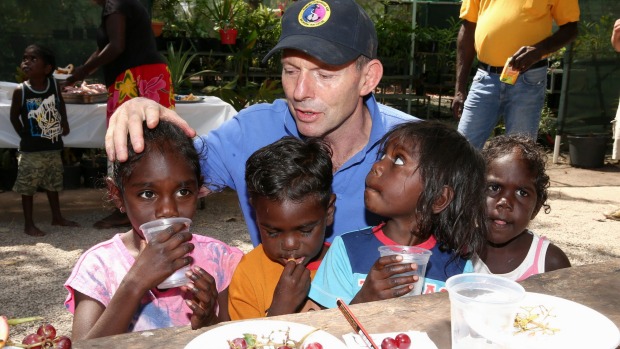Closing your ears on closing the gap

In 2008, Opposition indigenous affairs spokesman and ultimate opportunist, Tony Abbott, told The Age:
“When we were in government we could decide whether an apology (to the Stolen Generation) happened or not, but in opposition all we could decide was an attitude to an apology which was ultimately in the hands of others. My own view was if an apology was going to happen anyway why not make the most of the situation and at the very least not rain on the parade.”
It’s all about the look isn’t it Tony?
In 2011 Tony was interviewed by Chris Uhlman about the Northern Territory intervention:
“Well, I think that for too long there has not been the expectation that Aboriginal kids would go to school or the expectation that Aboriginal adults would take work. Now, we’ve got to break that expectation and one of the very encouraging things is that we now have senior, highly articulate Indigenous advocates, like Alison Anderson and Bess Price, who are saying things have got to change, our people have got to take responsibility, and at the heart of that is being normal Australians, at least in that respect. Our kids go to school and our adults go to work.”
And who better to advise the Prime Minister for Indigenous Affairs on how to “normalise” Aborigines than one of his favourite minority, “older, private school-educated, conservative white men”.
Billionaire mining magnate Andrew Forrest, was given the task to report on ways to improve training and education for Aboriginal and Torres Strait Islander people. Forrest has no particular expertise in this area apart from a compassionate interest and a personal record in looking for innovative ways to promote Indigenous employment.
The Forrest Review makes 27 recommendations, including that all welfare payments other than age and veterans’ pensions, be paid into an account which can be accessed with a new Healthy Welfare Card.
The card would only allow spending on goods and services deemed by the government to support a healthy lifestyle and would block the purchase of drugs, alcohol, or gambling.
The report also recommends financial penalties for parents whose children fall below a 90 per cent school attendance rate.
“I’m afraid over the last decade or so the truancy laws have effectively become a dead letter,” the prime minister said.
“I don’t say that welfare quarantining in these circumstances is necessarily the only answer. But I am absolutely determined to have some form of sanctions where the kids aren’t going to school.”
“There has to be consequences for sub-optimal behaviour.”
“If the states and territories aren’t prepared to do this or aren’t prepared to do it in what I think is a reasonable time-frame – with enough decisiveness – I will look at what we can do at a federal level to make this a reality.”
Russell Marks commented in The Monthly:
“Forrest’s report goes well beyond his brief, and advocates a return to the paternalistic and punitive welfare models of centuries past for not just Indigenous welfare recipients but hundreds of thousands of others. There are echoes of the “poor laws” of British mercantilism in his proposal to punish parents for their children’s non-attendance at school. His proposal to extend “income management” – that attempt at controlling how welfare recipients spend their money which has proven so divisive among Aboriginal communities – harks back to the trust accounts of past decades.
Like the Audit Commission’s report, Forrest’s report will be a bridge too far for the government, which begs the question: why does it persist in asking wealthy businessmen to report on matters outside their expertise?”
Eva Cox was also critical of Forrest’s report:
“This step backwards fails to accept that recognising and respecting the civilisations and contributions of Indigenous peoples is necessary to unravel the damages of long-term cultural dominance, which strips away communal strengths and well-being.
Nowhere does the report make any serious acknowledgement of systemic exclusion of both Indigenous knowledge and cultural competencies. It offers no recognition of the value of language diversity and the maintenance of cultural identity.
Missing too from the report are the data that show the failure of many of the proposed programs such as anti-truancy measures. Having children at schools that do not meet their needs does not improve outcomes.
Forrest dismisses oral cultures and languages, and all other learning that cannot be applied in job seeking. He ignores the importance of community and focuses on fixing individuals.”
In light of the very poor results in the recent Closing the Gap report, Tony’s comments on Australia Day 2012, the day the Aboriginal Tent Embassy in Canberra staged a 40th Anniversary celebration, sound even more out of touch:
“Look, I can understand why the tent embassy was established all those years ago. I think a lot has changed for the better since then. We had the historic apology just a few years ago, one of the genuine achievements of Kevin Rudd as prime minister. We had the proposal which is currently for national consideration to recognise indigenous people in the Constitution. I think the indigenous people of Australia can be very proud of the respect in which they are held by every Australian and, yes, I think a lot has changed since then and I think it probably is time to move on from that.”
And he wonders why they were offended.
The Closing the Gap report identified high levels of Aboriginal and Torres Strait Islander people with undetected treatable and preventable chronic conditions that impact significantly on life expectancy. The nation has the ability to make relatively large health and life expectancy gains in relatively short periods of time by focussing on access to appropriate primary healthcare services to detect, treat and manage these conditions.
They stress that good health is important to employment, education and community safety. Further, the health sector is the biggest employer of Aboriginal and Torres Strait Islander people and increased investment in health services will result in increased employment.
Evidence shows health services controlled by the Aboriginal community are outperforming others in the detection and treatment of health issues.
This is because they know that everything is connected. In health services controlled by the Aboriginal community, doctors, nurses and Aboriginal and Torres Strait Islander health workers treat each person in a holistic, culturally appropriate way. They spend longer with their patients, know their history and know how to deal with the complex issues they face daily – homelessness, food shortages and mental health issues.
The report also expresses concern “that hard won Aboriginal and Torres Strait Islander health gains could be negatively impacted by proposed measures contained in the 2014–15 Budget.”
Over the next five years $534 million will be cut from Indigenous programs administered by the Prime Minister and Cabinet and Health portfolios.
More than $160 million of the cuts will come out of Indigenous health programs. The health savings will be redirected to the Medical Research Future Fund.
Funding for Indigenous language support announced in the last budget will also be cut by $9.5 million over five years.
The Government failed to make any commitment to the National Partnership Agreement for Indigenous Early Childhood Development which, without extra funding, is likely to see 38 Indigenous childhood development centres across the country close.
There will be changes to the National Partnership Agreements that have controlled how the states and territories share spending in specific areas in Indigenous affairs.
The agreement on remote service delivery will be replaced by a new Remote Community Advancement Network and bilateral agreements with each state and territory.
The Closing the Gap report specifically warns against devolving responsibility to the States:
“The Campaign Steering Committee emphasises the need to ensure that potential changes in Commonwealth-State relations do not have the unintended effect of undermining the Closing the Gap Strategy. While recognising that all jurisdictions have a responsibility to contribute, the Campaign Steering Committee firmly supports the Australian Government’s continuing leadership role in an overall national approach.”
But the federal government thinks otherwise.
The Commonwealth has withdrawn responsibility for funding about 180 remote Aboriginal communities in WA in a move the State says could cost $10 billion over 20 years and threaten the health of vulnerable residents.
The latest Overcoming Indigenous Disadvantage report shows rates of Aboriginal and Torres Strait Islander imprisonment increased by 57 per cent between 2000 and 2013.
“It is scandalous that while Aboriginal and Torres Strait Islander peoples comprise less than 3 per cent of the Australian population, we now account for almost 30 per cent of the prison population,” Mr Cubillo said.
The Abbott government has stripped funding from the peak Aboriginal legal aid organisation and its state affiliates, but has moderated the extent of cuts to services at the coalface following an outcry from the indigenous community.
The cuts to NATSILS and all law reform and policy officer positions within each state and territory affiliate will save $9 million over three years
The budget did outline some new expenditure on Indigenous affairs – or perhaps a redirection of funding.
This includes a school truancy officer program in 74 schools at a cost of $18 million; $54 million over four years to build seven new police stations in remote communities; $2.5 million over four years to employ Community Engagement Police Officers in the NT; $6.8 million in 2014–15 for non-government schools with more than 50 Indigenous boarding students or where 50 per cent of boarding students are Indigenous students from remote or very remote areas; and $26 million for Indigenous teenage sexual health programs.
Far from self-determination, this government’s approach is to impose sanctions for what they perceive to be “deviant” behaviour. The ultimate nanny state will punish people into getting healthy, getting a good education followed by a job, “even if it is picking up rubbish”.
We have plenty of money for more police and truancy officers, and more gaols, but none for legal assistance, domestic violence programs, culturally relevant education, or preventative health initiatives.
Worse still, we show little respect for the knowledge and abilities of the original custodians of this land. Tony Abbott may think Australian history began with the First Fleet. In so doing he ignores the wisdom of the people who have the oldest continuous culture on the planet.









